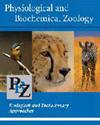Opportunities Lost? Evolutionary Causes and Ecological Consequences of the Absence of Trehalose Digestion in Birds
IF 1.8
3区 生物学
Q3 PHYSIOLOGY
引用次数: 1
Abstract
Trehalose is a nonreducing disaccharide that is a primary storage and energy source in prokaryotes, yeasts, fungi, and invertebrates. Vertebrates digest trehalose with the intestinal brush border membrane (BBM) enzyme trehalase. Intestinal trehalase activity is reported to be either very low or absent in several bird species. We assayed trehalase activity in 19 avian species, used proteomic analysis to quantify its abundance in the intestinal BBM, and used analyses of available genomes to detect the presence of the gene that codes for trehalase (Treh). We found no intestinal trehalase activity in birds, trehalase was absent from the proteome of their intestinal BBM, and the gene coding for trehalase was absent in their genomes. Surveys of available transcriptomes support the hypothesis that Treh is absent in birds. The trehalase gene was found in the same conserved syntenic block within the genome of all vertebrates surveyed except birds. Our analysis suggests that Treh was lost in an inversion followed by a reinsertion of a large gene block. This event appears to have taken place after the split between crocodiles and birds and dinosaurs. Birds are unable to digest a common dietary sugar like trehalose because their ancestor lost the trehalase gene. The loss of this gene seems to represent an ecological cost, as insectivorous birds seem to be unable to digest a carbohydrate present in their prey. We also speculate that the paucity of mycophagy in birds is due to the presence of large amounts of this sugar in fungal tissues.失去了机会?鸟类缺乏海藻糖消化的进化原因和生态后果
海藻糖是一种不还原的二糖,是原核生物、酵母、真菌和无脊椎动物的主要储存和能量来源。脊椎动物利用肠道刷状边界膜(BBM)酶海藻糖来消化海藻糖。据报道,几种鸟类的肠道海藻糖活性很低或不存在。我们测定了19种鸟类的海藻糖活性,使用蛋白质组学分析来量化其在肠道BBM中的丰度,并使用可用基因组的分析来检测编码海藻糖(Treh)的基因的存在。我们在鸟类中没有发现肠道海藻糖活性,其肠道BBM的蛋白质组中没有海藻糖,其基因组中也没有编码海藻糖的基因。对现有转录组的调查支持Treh在鸟类中不存在的假设。在除鸟类外的所有脊椎动物的基因组中,都发现了海藻糖基因的同一保守同源区。我们的分析表明,Treh在一次反转中丢失,随后又重新插入了一个大的基因块。这一事件似乎发生在鳄鱼、鸟类和恐龙分裂之后。鸟类无法消化像海藻糖这样的常见食糖,因为它们的祖先失去了海藻糖基因。这种基因的丧失似乎代表了生态成本,因为食虫鸟似乎无法消化猎物体内的碳水化合物。我们还推测,鸟类中真菌吞噬能力的缺乏是由于真菌组织中存在大量这种糖。
本文章由计算机程序翻译,如有差异,请以英文原文为准。
求助全文
约1分钟内获得全文
求助全文
来源期刊
CiteScore
3.20
自引率
6.20%
发文量
62
审稿时长
6-12 weeks
期刊介绍:
Physiological and Biochemical Zoology: Ecological and Evolutionary Approaches primarily publishes original research in animal physiology and biochemistry as considered from behavioral, ecological, and/or evolutionary perspectives. Studies at all levels of biological organization from the molecular to the whole organism are welcome, and work that integrates across levels of organization is particularly encouraged. Studies that focus on behavior or morphology are welcome, so long as they include ties to physiology or biochemistry, in addition to having an ecological or evolutionary context.
Subdisciplines of interest include nutrition and digestion, salt and water balance, epithelial and membrane transport, gas exchange and transport, acid-base balance, temperature adaptation, energetics, structure and function of macromolecules, chemical coordination and signal transduction, nitrogen metabolism and excretion, locomotion and muscle function, biomechanics, circulation, behavioral, comparative and mechanistic endocrinology, sensory physiology, neural coordination, and ecotoxicology ecoimmunology.

 求助内容:
求助内容: 应助结果提醒方式:
应助结果提醒方式:


